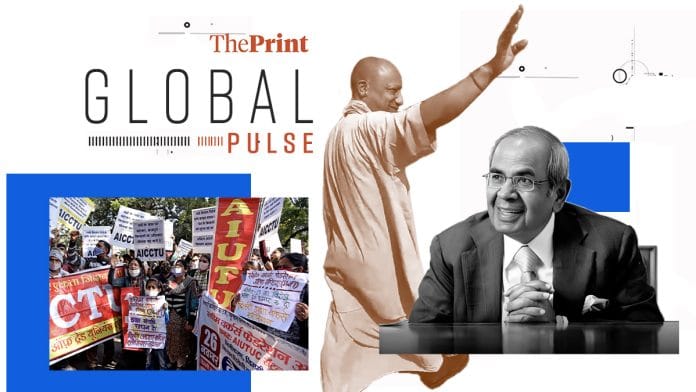New Delhi: The Economist, in its article ‘Meet the road-building, Muslim-baiting monk who could rule India’, states that Uttar Pradesh Chief Minister Yogi Adityanath represents a significant strain in Indian politics of “a muscular Hindu nationalism that lays a lot of asphalt”. The magazine, in an interview with Adityanath, discusses UP’s development, the roadmap ahead, and the CM’s relationship with the Muslim population.
“On his watch, UP has grown at an annualised rate of 6.9% (excluding 2020-21, when the entire country was ravaged by COVID). In the past three years, it has grown faster than India, as a whole,” says The Economist. “UP was once regarded as a sick state,” Adityanath has been quoted as telling the magazine, adding, “Now, it is one of India’s economic growth engines”.
The magazine highlights the infrastructure boom in UP, highlighting “four-lane highways” and the integration of villages. “Funding is not a constraint,” Adityanath says. But while the pace of the “development” is frenetic, it remains to be seen whether the development mode is sustainable.
“UP has failed to attract labour-intensive industries, such as clothing, that could absorb its giant workforce. Its economy is powered by a small number of high-value jobs in the West. Elsewhere, there is a long tail of low-quality, informal work. Frustration over the lack of opportunity was one reason why the BJP lost a swathe of seats in the state in national elections last year,” The Economist says.
While the focus is on UP’s “growth”, it also delves into the elephant in the room—the CM’s treatment of the state’s large Muslim population.
“Muslims complain that the bulldozers are especially active in their neighbourhoods. In general, they are frightened of Mr Adityanath. He founded a youth movement that many described as a militia, only to disband it five years after becoming chief minister. In speeches, he often uses incendiary language about Muslims,” the article notes.
However, Adityanath tells The Economist that “there is no Hindu-Muslim conflict in Uttar Pradesh”. He boasts that “in the past eight-and-a-half years, there have been zero instances of rioting and no curfews”.
BBC’s Nikhil Inamdar and Arunoday Mukharji dissect India’s “sweeping” labour law reforms, which have been seeing massive protests from workers and trade unions.
“The government says the long-pending reforms aim to modernise outdated laws, simplify compliance, and protect workers’ rights—while giving legal recognition to India’s growing gig workforce for the first time,” says the report. “But even with the many welcome provisions, two contentious clauses in the reforms have particularly irked unions.”
The rules under contention make it “easier for companies to fire workers” and “harder for workers to legally conduct strikes”. “Pending grievance cases for labourers are already in millions. Cases are not being registered… workers are not able to lodge their complaints, and now the government is bringing in a labour code, which is trying to exclude a huge section of the workforce,” Sudeep Dutta, CITU’s (Centre for Indian Trade Unions’) national secretary, tells BBC.
Certain economists, however, argue that the old rules were more “draconian” and were responsible for “hampering India’s competitiveness compared to countries like Bangladesh, Vietnam, and China”.
Gopichand Hinduja and his brothers turned their father’s trading business into an international conglomerate spread across sectors, from banks to Bollywood. In The Guardian, Martin Adeney writes an obituary for the late mogul—one of UK’s richest men.
“They [the Hindujas] were well placed to take advantage of the decline of old imperial companies and the reshaping of western businesses in the second half of the 20th century. Trophy acquisitions included Ashok Leyland, India’s giant truck maker, and Gulf Oil’s chain of petrol stations in 50 countries,” the report reads. “In the US, where they took an office in Trump Tower in the mid-80s, they spent a billion on the world’s largest metal fluids manufacturer.”
Gopichand was more “outgoing” than his “publicity-shy” father, and was happy to take the reins. “In what occasional interviews were permitted, Gopichand was a past master at turning substantive questions about operations into generalised musings. ‘We all work for a common cause,’ he said. ‘We are not materialistic, although we like economic growth. It is a unique system.’ Adding, to quote his father, ‘Everything belongs to everyone. Nothing belongs to anyone’.”
(Edited by Madhurita Goswami)
Also Read: Delhi’s ‘fixed’ air emergency & the geopolitics behind India’s counter-terror tightrope






